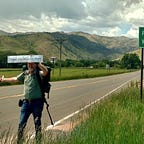Support the Troops — Subscribe
I get up early most days. Sundays are my favorite. Before my morning run (usually with friends, these days solo) I totter out to the curb, push open the gate, and retrieve the newspaper. It’s wrapped in a plastic bag, tucked into the plastic sleeve underneath the mailbox.
I tuck the paper under my armpit. Gracie follows me back into the house and settles into her perch on the window box. She’s used to this routine of mine, but, like a growing number of my human compatriots, she does not understand it. Reading the paper is increasingly a ritual practiced by old people.
Give me enough time and enough coffee, I could try to convince you of the value of an old-fashioned dead trees experience of ingesting your news (deadlines, periodicity, curation , randomness— don’t get me started). Grab a beer and hook me up on Zoom and I’ll give you all the time you want to sell me on the superiority of digital news platforms (immediacy, reader feedback, portability — I feel ya).
We don’t have time for that debate. In our town, and we are not unlike yours, the thing that the old folks call the newspaper and everyone else calls their news feed are fueled by one and the same effort — reporting. Not sitting in studios. Not entertaining. Not reposting, aggregating, or speculating.
In a time of crisis in an era of information overload, we can be forgiven for asking “who can we believe?” But we can’t throw up our hands. We won’t be forgiven if we don’t think hard enough to answer the question. The answer is the same as it always has been. We can trust the people who go to the source. We can trust the people who ask the hard questions and press for the answers. We can trust the people who name their sources. We can trust people who don’t ask us to trust them — they don’t need to because they show us their work — it’s called attribution.
If we have quickly gotten ourselves up to speed on matters as complex as viral spread and epidemiological modeling, we can simultaneously challenge ourselves to look closely at news sources and determine which ones are serious and which are not.
In most towns, serious means the daily paper. Sadly, in too many towns there’s only one. As a reporter and columnist for our weekly paper, it was my job for years to take swipes at what we called the old gray lady downtown. They were too white, too close to people in power, too timid, too (you fill in the blank)… Guess what? Our weekly died, and the daily is still fighting to survive.
The internet hollowed out newsrooms all across the country — COVID 19 may manage to finish them off.
It’s time to subscribe. If you’re one of those free riders who somehow think news falls from the sky, it’s time to grow up. Journalists have bad habits — they like to eat, send their kids to school, and sleep indoors. Just like the rest of us. Their livelihoods rely on advertising that no longer exists. Their management struggles to figure out how to replace those dollars by selling online ads (you try competing with Google and let me know how that goes).
Smarter people will have to figure out how we get our news in the future. For now, we have to rely on the papers and their digital cousins. Take a look at today’s news, in your mailbox or at Syracuse.com.
You’ll find stories of the doctors in the ICU, recovered patients donating their blood, debates about where the ventilators should go, analysis of how we got here, lists of virtual events, even pictures of empty red stools at local diners. These are all gathered, vetted, and published by your neighbors. Each one of them, with their laptop, their phone, their cameras, are on the front lines. If this is a war, these are your war correspondents. Newspapers are starting to lay people off, even now, when they are needed more than ever.
It’s time to support these troops.
